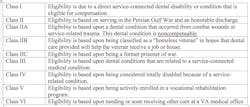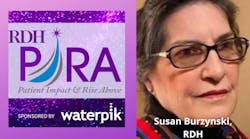Those who serve our country are underserved by dentistry
On Veterans Day November 11,1 Americans offer gifts and services to the brave men and women who served in the US armed forces. One of the ways we honor them is by dental professionals providing them with needed oral health-care services, often for free. This is because veterans are underserved when it comes to dental care.
The public may see veterans as those who served in one of the service branches of the US military. The Veterans Authority definition is someone released from military duty by any means besides dishonorable.2 Congress has a slightly different definition—a man or woman who served active military, naval, space, or air for a minimum time who was not dishonorably discharged. Congress also states that men and women serving in the National Guard or as reservists are not always given veteran status.3
The 2022 census recorded 16.2 million veterans in the US, with a quarter of them over the age of 75.4 The problem becomes—while there are millions of veterans living in the US according to Congress—not all of them are defined as a veteran nor eligible for military benefits.
If they qualify, a veteran can receive free dental care at a Veteran Affairs (VA) clinic.5,6 However, the rating system for dental benefits is complex and involves screening for nine qualifying circumstances that warrant a veteran receiving free dental care. Figure 1 summarizes the benefits of the nine classes of dental benefits.6
The Department of American Veterans (DAV) recently reported that an alarming numbers of veterans who need dental care may not be applying for benefits because they believe they may not have a qualifying circumstance. According to the DAV, 1.3 million veterans are enrolled in the DAV health-care system. However, only 463,000 received dental care in 2020.5
The DAV has found that the current system that determines how much in dental care benefits are distributed by Congress is complicated and causes veterans to forgo dental care. Furthermore, VA dental clinics nationwide report being short staffed and thus limited in how many patients they can treat.7 With a complicated qualifying system and a shortage of providers, it’s no wonder many veterans don’t receive the dental care they deserve.
An act introduced to help with these shortfalls
The dire needs of veterans' oral health care have not fallen on deaf ears. In 2020, the DAV reported an estimated backlog of 2.5 million dental procedures.7 The Veterans Dental Care Eligibility Expansion and Enhancement Act of 2021 was developed by senators to provide more dental care to veterans by easing some of the strict benefit qualifications. In addition, they hope to entice more new graduates of dental professional programs to work at VA clinics, and thus benefit from better student loan repayment programs. Finally, senators hope to open VA clinics in all 50 states.
In 2022, 600,000 veterans were able to undergo dental treatment, but 7.8 million veterans did not qualify for any dental benefit.8 The ADA agreed with the senators’ actions in 2021 and set aside a day to discuss why veterans were not receiving care and how to better address this need.8 The ADA also called for Congress to allow more benefits and distribute them to more veterans. The ADA hopes to have several opportunities across the country that will provide better access to care for veterans in 2024.8
What can dental professionals do to support veteran patients? With the unique needs of this population, clinicians need to be aware of some challenges to overcome in order to provide effective, accessible care.
Many veterans are entitled to dental benefits through the VA
It’s a good idea to discuss this with any veteran who visits a civilian dental practice for care, as individual benefits vary. Some veterans might only be able to take advantage of their benefits by receiving care at a VA clinic, while others might be eligible for the VA dental insurance program, which allows them to seek care in private practice settings and operates similarly to traditional dental insurance.
Oral health may not be at the top of a veteran’s list of priorities
Depending on the person’s experiences, mental health status, and financial situation, dental care might fall near the bottom of their list. Having an in-depth conversation with a veteran patient will help you better understand the individual’s abilities, needs, and readiness for any necessary treatment.
There may be unique obstacles preventing a veteran from performing proper oral care at home
From the clinician’s perspective, it can be frustrating to have repeated conversations with a patient about oral hygiene instruction, only for them to return in the same (or worse) condition. Professionals need to know that many veterans have physical, mental, or cognitive barriers that make everyday biofilm removal techniques difficult. People in these situations need compassion and understanding from their providers, not judgment.
When challenges in traditional oral care are identified, veterans need alternatives
This could mean deviating from what’s considered “gold standard” home hygiene practices. Some patients may not be able to tolerate an electric toothbrush or water flosser. Others might lack the hand dexterity to use string floss or the patience to wear medicated custom trays. These situations require the clinician to use critical thinking skills to present options.
Veterans need to know we care
Care is perceived in many ways, from gentle eye contact, acts of assistance, a friendly attitude, or a genuine desire to hear someone’s story about their military career. Although many veterans appreciate these efforts from their health-care providers, some may not. They might feel patronized by a clinician’s offer to help or feel uncomfortable discussing their experiences. In these cases, their feelings must be respected and honored.
Veterans are a relatively small yet significant part of the population with unique experiences, customs, values, and needs. The nation has fallen short in showing our gratitude for them where their oral health care is concerned. Dental professionals can take a more active role in advocating for veterans, whether through public education, legislative support, or compassionate clinical care. Through our efforts, perhaps one day we can truly repay these heroes for their courage and sacrifice.
Editor's note: This article appeared in the July 2024 print edition of RDH magazine. Dental hygienists in North America are eligible for a complimentary print subscription. Sign up here.
References
- Veterans Facts and Information. U.S. Department of Veterans Affairs. November 3, 2023. https://department.va.gov/veterans-day/facts-and-information/?redirect=1
- What is a veteran? The Legal Definition. Veterans Authority. 2023. https://va.org/what-is-a-veteran-the-legal-definition/
- U.S. Department of Veterans Affairs: Who is a veteran? Congressional Research Service. November 2, 2022. https://crsreports.congress.gov/product/pdf/R/R47299
- Veterans. United States Census Bureau. June 02, 2020.: https://www.census.gov/topics/population/veterans.html
- Saintsing M. DAV works to expand who qualifies for VA dental care. DAV. July 12, 2022. https://www.dav.org/learn-more/news/2022/expanding-va-dental-care/
- McVeigh K. VA disability rating for dental conditions. 2024. Veterans Guide. https://veteransguide.org/va-disability/ratings/dental/
- Sanders B. Sanders introduces legislation to expand veterans dental and health care. October 20, 2021. U.S. Senate Sergeant at Arms. https://www.sanders.senate.gov/press-releases/news-sanders-introduces-legislation-to-expand-veterans-dental-and-health-care/
- Burger D. ADA continues to advocate for veterans' access to care as 2024 approaches. November 09, 2023. America Dental Association. https://www.adanews.ada.org/ada-news/2023/october/ada-continues-to-advocate-for-veterans-access-to-care-as-2024-approaches/
About the Author

Tracee S. Dahm, MS, RDH
Tracee S. Dahm, MS, BSDH, is an adjunct clinical instructor for the North Idaho College School of Dental Hygiene. She also works in private practice. Dahm has been published in dental journals, magazines, webinars, and textbooks, and featured on dental podcasts. She is a key opinion leader on cutting-edge innovations in the hygiene field. Her research interests include trends in dental hygiene, improving access to dental care for the underserved, and mental health. She can be reached at [email protected].

Bethany Montoya, MBA, RDH
Bethany Montoya, MBA, RDH, is a practicing dental hygienist, educator, industry key opinion leader, and editorial director of DentistryIQ’s Clinical Insights newsletter. She has a passion for advancing modern disease prevention. She specializes in exploring the intersection of clinical practice, professional growth, and innovation within oral health care. Through her writing, she aims to educate, inspire, and spark meaningful dialogue in the dental community. She can be reached at [email protected].



